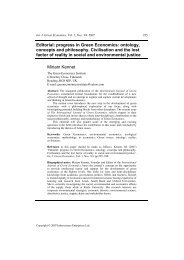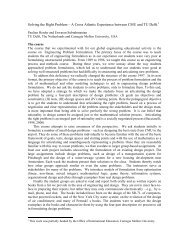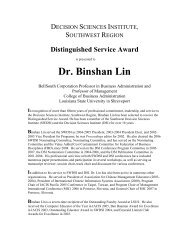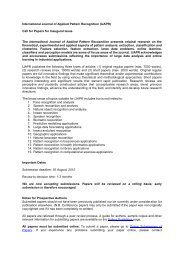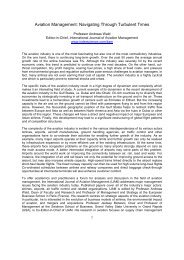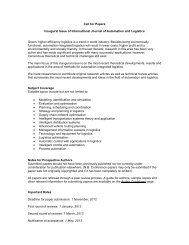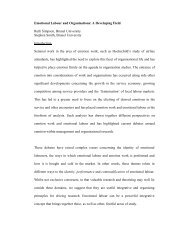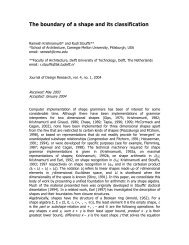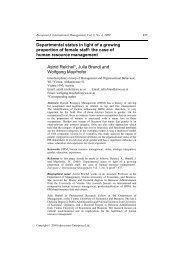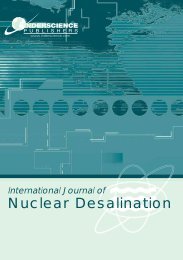A new Zeitgeist for international business activity and ... - InderScience
A new Zeitgeist for international business activity and ... - InderScience
A new Zeitgeist for international business activity and ... - InderScience
You also want an ePaper? Increase the reach of your titles
YUMPU automatically turns print PDFs into web optimized ePapers that Google loves.
A <strong>new</strong> <strong>Zeitgeist</strong> <strong>for</strong> <strong>international</strong> <strong>business</strong> <strong>activity</strong> <strong>and</strong> scholarship 281<br />
bottles’ – at least in part – as we move out of the euphoria of the most recent phase of<br />
globalisation (reminiscent of the 1960s) into a backlash (reminiscent of the 1970s,<br />
Sauvant, 2006). Our judgement is that, on balance, it is the first, but, in the short<br />
run, there are features of the second – as is being currently voiced by many of the critics<br />
of globalisation, <strong>and</strong> is being demonstrated by the emerging pattern of IB <strong>activity</strong>.<br />
What then might be the ingredients of the <strong>new</strong> <strong>Zeitgeist</strong>? We would suggest<br />
three – which affect both IB <strong>activity</strong> <strong>and</strong> IB scholarship. 2 These are <strong>new</strong> issues, <strong>new</strong><br />
mindsets <strong>and</strong> <strong>new</strong> actors, each of which, of course, closely interacts with the other two.<br />
Some indirectly affect the content <strong>and</strong> structure of globalisation: others are the direct<br />
cause or consequence of it. Let us deal with each ingredient in turn.<br />
3.1 New issues<br />
First, some <strong>new</strong> issues – or if not <strong>new</strong> – an increased attention given to, or<br />
reprioritisation, of existing issues. The big picture <strong>for</strong> IB practitioners, governments, <strong>and</strong><br />
the IB community in general (IBC <strong>for</strong> short) is as it always has been. How can one best<br />
maximise the net benefits of the regionalisation <strong>and</strong> globalisation of economic <strong>activity</strong><br />
while retaining the desired <strong>and</strong> legitimate social <strong>and</strong> cultural values, specific to local<br />
communities?. However, the focus <strong>and</strong> the <strong>Zeitgeist</strong> of this objective is changing.<br />
The opportunities <strong>and</strong> challenges of both globalisation <strong>and</strong> localisation are more<br />
multidimensional, involve more constituents, <strong>and</strong> embrace more complex <strong>and</strong> value<br />
laden issues than once they did. The role of institutions is given more prominence<br />
(Djelic <strong>and</strong> Quack, 2003). In short, the contemporary spirit of the big picture requires a<br />
more holistic <strong>and</strong> multifaceted, yet more balanced, contextual <strong>and</strong> human approach to the<br />
causes <strong>and</strong> impact of globalisation.<br />
Within the big picture, the following are some which deserve more attention by the<br />
<strong>international</strong> <strong>business</strong> community.<br />
• The interface between different sources of knowledge creation <strong>and</strong> application.<br />
One example is that between science <strong>and</strong> technology as seen e.g., in nano-technology<br />
<strong>and</strong> stem cell research. Another is the application of the latest generation of advances<br />
of computer technology to neuro-science research. A third is the growing interface<br />
between fibre optic materials technology <strong>and</strong> broadb<strong>and</strong> internet connectivity<br />
(Mann <strong>and</strong> Gotz, 2006).<br />
• The heightened emphasis on development issues <strong>and</strong> especially poverty reduction,<br />
as exemplified, <strong>for</strong> example, by the Millennium Development Goals, <strong>and</strong> the<br />
reconfiguration of World Bank lending initiatives which now encourage a shared<br />
ownership of any projects financed by them.<br />
• A re<strong>new</strong>ed focus on the sustainability of natural resources; <strong>and</strong>, particularly, their<br />
relevance <strong>for</strong> environmental protection, energy conservation <strong>and</strong> global climate<br />
change.<br />
• Security issues are also now upfront on the <strong>international</strong> agenda, especially with<br />
respect to trade in ‘bads’ e.g., arms, drugs, terrorism, etc. <strong>and</strong> also as a result<br />
of the heightening of religious/ethnic divisions. More attention is also being<br />
paid to the implications <strong>for</strong> risk management <strong>and</strong> the intervention strategies<br />
of MNEs in response to violent conflict in the countries in which they operate<br />
(Detzel et al., 2007).




